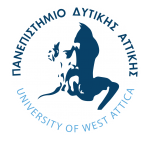Course info:
Semester: 5
General Foundation
ECTS: 6
Hours per week: 3
Professor: T.B.D.
Teaching style: Face to face, usage of specialized software
Grading: Homework / Projects (60%), Final written exam (40%),
| Activity | Workload |
|---|---|
| Lectures | 36 |
| Class assignments / projects | 42 |
| Independent study | 72 |
| Course total | 150 |
Learning Results
Upon successful completion of the course, students will have acquired:
- Design, train and implement deep learning models for a wide range of applications
- Possess a critical understanding of the different characteristics, capabilities and limitations of different deep learning techniques (DNNs, CNNs and their variations, RNNs and their variations, Stacked Autoencoders, DBNs, GANs, etc.) and select the appropriate ones for different cases of complex problem solving
- Background enabling to follow, understand and assess future theoretical and technological developments in the field of Deep Learning
- Ability to combine and integrate theoretical and technological ideas and mechanisms from other fields to improve and extend the functionality enabled by deep learning
Skills acquired
- Data and information retrieval, analysis and synthesis
- Decision making
- Individual work
- Team work
- New research ideas generation
- Promotion of free, creative and inductive thinking
Recalls on Neural Networks, Multi Layer Perceptrons, Backpropagation
• Loss functions, Hyperparameter tuning, Regularization, Model selection, weight decay, dropout, Optimization (SGD, Rprop, adam, rmsprop)
• Deep Neural Networks
• Convolutional Neural Networks (CNN), LeNet/AlexNet, Deep Residual Networks (ResNet). Application sof CNNs (Single-Image Super-Resolution, Object detection)
• CNN variations and other solutions for object detection: R-CNN, Fast R-CNN, Faster R-CNN, Mask R-CNN, SSD, YOLO
• Recurrent Neural Networks, Long Short-Term Memory Networks, Gated Recurrent Units, Bidirectional LSTM
• Transformers, sequence-to-sequence (seq2seq) learning, attention
• Generative Models. Restricted Boltzman Machines, Deep Boltzman Machines, Deep Belief Networks). Autoencoders, Stacked (Denoising AutoEncoders), Variational Autoencoders. Generative Adversarial Networks.
- Deep Learning, I. Goodfellow, Y. Bengio and A. Courville, MIT Press, 2016, http://www.deeplearningbook.org.
- Deep Learning with Python, F. Chollert, 2nd Edition, Manning
- Neural Networks and Deep Learning: A Textbook, C. Aggarwal, 2018, Springer
Related scientific journals:
- IEEE Transactions on Pattern Analysis and Machine Intelligence
- Journal of Machine Learning Research
- IEEE Transactions on Neural Networks and Learning Systems
- NeurIPS conference proceedings
- Learning Results - Skills acquired
-
Learning Results
Upon successful completion of the course, students will have acquired:
- Design, train and implement deep learning models for a wide range of applications
- Possess a critical understanding of the different characteristics, capabilities and limitations of different deep learning techniques (DNNs, CNNs and their variations, RNNs and their variations, Stacked Autoencoders, DBNs, GANs, etc.) and select the appropriate ones for different cases of complex problem solving
- Background enabling to follow, understand and assess future theoretical and technological developments in the field of Deep Learning
- Ability to combine and integrate theoretical and technological ideas and mechanisms from other fields to improve and extend the functionality enabled by deep learning
Skills acquired
- Data and information retrieval, analysis and synthesis
- Decision making
- Individual work
- Team work
- New research ideas generation
- Promotion of free, creative and inductive thinking
- Course content
-
Recalls on Neural Networks, Multi Layer Perceptrons, Backpropagation
• Loss functions, Hyperparameter tuning, Regularization, Model selection, weight decay, dropout, Optimization (SGD, Rprop, adam, rmsprop)
• Deep Neural Networks
• Convolutional Neural Networks (CNN), LeNet/AlexNet, Deep Residual Networks (ResNet). Application sof CNNs (Single-Image Super-Resolution, Object detection)
• CNN variations and other solutions for object detection: R-CNN, Fast R-CNN, Faster R-CNN, Mask R-CNN, SSD, YOLO
• Recurrent Neural Networks, Long Short-Term Memory Networks, Gated Recurrent Units, Bidirectional LSTM
• Transformers, sequence-to-sequence (seq2seq) learning, attention
• Generative Models. Restricted Boltzman Machines, Deep Boltzman Machines, Deep Belief Networks). Autoencoders, Stacked (Denoising AutoEncoders), Variational Autoencoders. Generative Adversarial Networks.
- Recommended bibliography
-
- Deep Learning, I. Goodfellow, Y. Bengio and A. Courville, MIT Press, 2016, http://www.deeplearningbook.org.
- Deep Learning with Python, F. Chollert, 2nd Edition, Manning
- Neural Networks and Deep Learning: A Textbook, C. Aggarwal, 2018, Springer
Related scientific journals:
- IEEE Transactions on Pattern Analysis and Machine Intelligence
- Journal of Machine Learning Research
- IEEE Transactions on Neural Networks and Learning Systems
- NeurIPS conference proceedings
